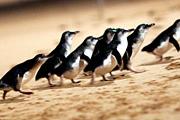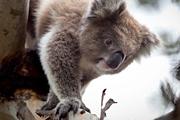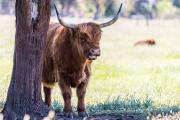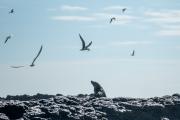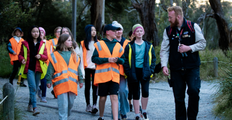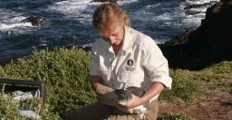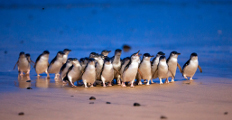Senior Scientist
Duncan is a vertebrate population ecologist with expertise in pest animals, wildlife conservation and population modelling. His research focusses on the drivers of population change to inform best practise conservation and management of wildlife. He is an Honorary Fellow at The University of Melbourne, Chair of the Eastern Barred Bandicoot National Recovery Team, and member of numerous external advisory committees.
Email: dsutherland@penguins.org.au
Phone: + 61 (3) 59512850
Mail: Phillip Island Nature Parks, PO Box 97, Cowes Vic. 3922, Australia
Professional Area
Vertebrate ecology, island fauna conservation and population modelling
Current projects
- Conservation of the Endangered Eastern barred bandicoot
- Reintroduction of Critically Endangered bush stone-curlew
- Feral cat ecology and management
- Shearwater breeding and movement ecology
- Hyperabundant wildlife ecology
- Distribution and abundance of breeding seabirds in Victoria
- Invasive predator impacts, management and eradication
- Mesopredator release and trophic cascades
- Re-establishing island faunal diversity and function
Education
2005 - Ph.D. (Ecology), Monash University, Clayton
1998 - Honours (Zoology), Monash University, Clayton
1998 – Bachelor of Arts, Monash University, Clayton
Current students
-
Rebecca Groenewegen (PhD; University of Melbourne)
-
Aviya Naccarella (PhD; Deakin University)
-
Paula Wasiak (PhD; Australian National University)
Selected recent publications (see full list in Research Gate)
Adriaanse, K., Lynch, M., Sutherland, D. R., Traub, R., Lowe, J., and Hufschmid, J. (2024). Toxoplasma gondii does not inhibit the assisted colonization of eastern barred bandicoots (Perameles gunnii) to Phillip Island, Victoria, Australia. Journal of Wildlife Diseases 60, 116-125.
Bryant, S. L., Bower, H., Bower, S., Copley, P. B., Dann, P., Matassoni, D., Sprod, D., and Sutherland, D. R. (2022). Island partnerships building collective impact. Pacific conservation biology 28, 303-314. doi: 10.1071/PC21021.
Rendall, A. R., Sutherland, D. R., Cooke, R., and White, J. G. (2022). Does the foraging ecology of feral cats change after the eradication of foxes? Biological Invasions 24, 1413-1426. doi: 10.1007/s10530-021-02718-x.
Tan, L. X. L., van Dongen, W. F. D., Sherman, C. D. H., Ekanayake, K. B., Dann, P., Sutherland, D. R., and Weston, M. A. (2021). Transmission of a novel predatory behaviour is not restricted to kin. Biological Invasions, 1-12. doi: 10.1007/s10530-021-02517-4.
Rendall, A. R., Sutherland, D. R., Baker, C. M., Raymond, B., Cooke, R., and White, J. G. (2021). Managing ecosystems in a sea of uncertainty: invasive species management and assisted colonizations. Ecological Applications 31, e02306. doi: https://doi.org/10.1002/eap.2306.
Rendall, A. R., Webb, V., Sutherland, D. R., White, J. G., Renwick, L., and Cooke, R. (2021). Where wildlife and traffic collide: Roadkill rates change through time in a wildlife-tourism hotspot. Global Ecology and Conservation 27, e01530. doi: 10.1016/j.gecco.2021.e01530.
Halstead, L. M., Sutherland, D. R., Valentine, L. E., Coetsee, A. L., Rendall, A. R., and Ritchie, E. G. (2020). Digging up the dirt: quantifying the effects on soil of a translocated ecosystem engineer Austral Ecology 45, 97-108. doi: 10.1111/aec.12833.
Rout, TM, Kirkwood, R, Sutherland, DR, Murphy, S, McCarthy, MA (2014) When to declare successful eradication of an invasive predator. Animal Conservation 17, 125–132.





